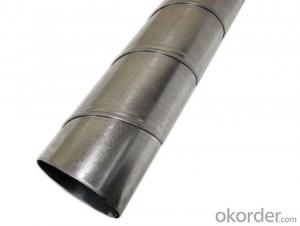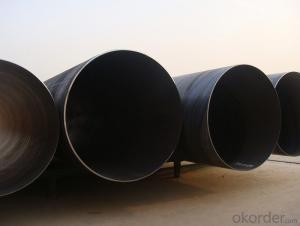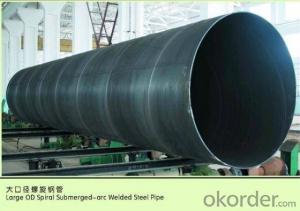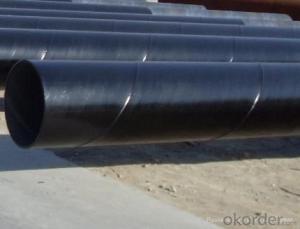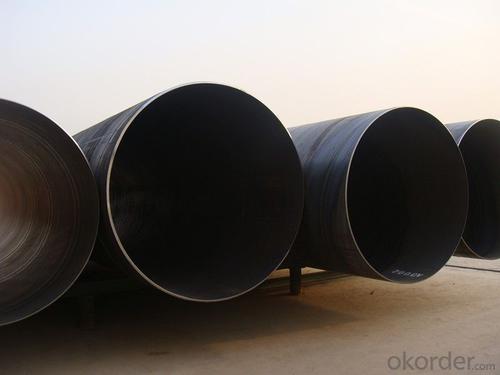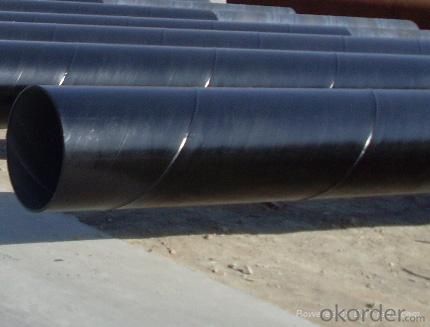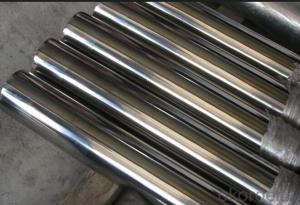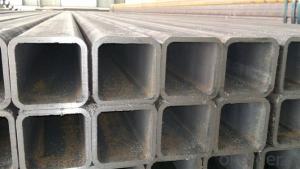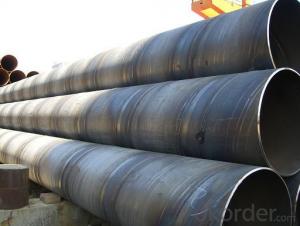SPIRAL STEEL PIPE
- Loading Port:
- China Main Port
- Payment Terms:
- TT OR LC
- Min Order Qty:
- -
- Supply Capability:
- -
OKorder Service Pledge
OKorder Financial Service
You Might Also Like
Packaging & Delivery
Packaging Detail: | standard export packing or as customer's requirement |
Delivery Detail: | within 10 - 30 days |
Specifications
Spiral Welded Steel Pipes and Tubes
1.Material:Q195-Q235
2.Length:1-12m
3.WT:1.0-14mm
4.O.D.:20-273mm
Spiral Welded Steel Pipes and Tubes
Product Description:
1.Material : Q235,Q345,L245,L290,L360,L415,L450,L485,GrB,X42,46,X52,X56,X60,X65,X70,X80,X100
2,Standard: SY/T5037-2000,GB/T9711-2011,API Spec 5L PSL1/PSL2,ASTM A252\A53,ISO3183,DIN17172,EN10217,JIS G3457,AWWA C200,ASTM A139,ASTM A671,ASTM A672
3.Wall thickness: 3.0mm-30mm
4.Outer diameter: φ168mm-3020mm
5,Length: 5m-12m or as your requirement
6,Corrosion protection standard: DIN30670,DIN30671, AWWAC210, AWWA C203, SY/T0413-2002,SY/T0414-2002
7,Application: Oil, gas, natural gas, water pipe, thermal electricity pipe, steel structure engineering, etc
Q195-q345 Material Steel Pipe's Materials
Elements | Chemical Compsition% | Mechanical Property | ||||||
| C% | Mn% | S% | P% | Si% | Yield Point (Mpa) | Tensile Strength(Mpa) | Elongation |
Q195 | 0.06-0.12 | 0.25-0.50 | <0.050 | <0.045 | <0.030 | >195 | 315-430 | 32-33 |
Q215 | 0.09-0.15 | 0.25-0.55 | <0.05 | <0.045 | <0.030 | >215 | 335-450 | 26-31 |
Q235 | 0.12-0.20 | 0.30-0.70 | <0.045 | <0.045 | <0.030 | >235 | 375-500 | 24-26 |
Q345 | <0.20 | 1.0-1.6 | <0.040 | <0.040 | <0.55 | >345 | 470-630 | 21-22 |
- Q: Can steel pipes be used for stadium construction?
- Yes, steel pipes can be used for stadium construction. Steel pipes offer several advantages that make them suitable for this purpose. Firstly, steel pipes are strong and durable, making them capable of withstanding heavy loads and providing structural stability to large structures like stadiums. They have high tensile strength, which means they can resist bending or breaking under pressure. Additionally, steel pipes are resistant to corrosion, which is crucial for outdoor structures like stadiums that are exposed to various weather conditions. Their resistance to rust and other forms of degradation ensures the longevity of the stadium. Furthermore, steel pipes are versatile and can be easily fabricated into different shapes and sizes, allowing for customized designs and efficient installation. Moreover, steel pipes offer cost-effectiveness in stadium construction. They can be easily produced in large quantities, making them readily available and affordable. The ease of transportation and installation of steel pipes also contributes to their cost-effectiveness. Another advantage of using steel pipes for stadium construction is their sustainability. Steel is a recyclable material, and using steel pipes promotes environmental responsibility. The recyclability of steel reduces the demand for new materials and minimizes waste. In summary, steel pipes can indeed be used for stadium construction due to their strength, durability, resistance to corrosion, versatility, cost-effectiveness, and sustainability.
- Q: What type of steel pipe dance is used in general?
- According to international competition practice, the standard size of steel tube is 40 mm or 45 mm in diameter, and the 45mm is usually used. The height of the steel pipe is not less than 3.3 meters and not higher than 4 meters.
- Q: What are the different types of steel pipe fittings for industrial applications?
- There are several types of steel pipe fittings commonly used in industrial applications, including elbows, tees, reducers, couplings, flanges, and unions. These fittings are designed to connect and redirect the flow of fluids or gases within a piping system, ensuring proper functionality and efficiency in various industrial processes.
- Q: What are the environmental impacts of steel pipe production?
- The environmental impacts of steel pipe production include the extraction of raw materials (iron ore, coal, and limestone) which leads to habitat destruction and soil erosion. The manufacturing process requires significant energy, contributing to greenhouse gas emissions and air pollution. Additionally, the production generates waste materials, such as slag and by-products, that can contaminate water sources if not properly managed. Finally, the transportation of steel pipes adds to carbon emissions and can disrupt ecosystems if not done sustainably.
- Q: Are steel pipes suitable for underground drainage systems?
- Yes, steel pipes are suitable for underground drainage systems. Steel pipes have several qualities that make them a popular choice for underground drainage. Firstly, steel pipes are strong and durable, capable of withstanding high pressure and heavy loads. They are resistant to corrosion and can last for many years without the need for frequent maintenance or replacement. Steel pipes also have the advantage of being versatile and adaptable to different soil conditions. They can be easily customized to fit the specific needs of the drainage system, including varying diameters and lengths. Additionally, steel pipes can be welded together, ensuring a tight and secure connection that prevents leakage and the infiltration of groundwater. Another benefit of steel pipes in underground drainage systems is their ability to handle a wide range of temperatures. They are resistant to extreme heat or cold, making them suitable for various climates and environments. However, it is important to note that steel pipes can be more expensive than alternative materials like PVC or HDPE pipes. Additionally, they can be heavier and more difficult to install, requiring specialized equipment and expertise. Overall, steel pipes are a reliable and long-lasting option for underground drainage systems, particularly in areas where durability and strength are important considerations.
- Q: How do steel pipes compare to other materials like PVC or copper?
- Steel pipes are known for their exceptional strength and durability, making them suitable for various applications. Compared to materials like PVC or copper, steel pipes offer higher resistance to corrosion, fire, and extreme temperatures. They also have a longer lifespan and can withstand high pressure and heavy loads. However, steel pipes are generally more expensive and require regular maintenance to prevent rusting. PVC pipes, on the other hand, are more affordable, lightweight, and easy to install, but they are less durable and have lower temperature resistance. Copper pipes are known for their excellent heat conductivity and resistance to corrosion, but they are more expensive and can be prone to theft. Ultimately, the choice between steel, PVC, or copper pipes depends on the specific requirements of the project and the budget.
- Q: What is the difference between steel pipe and HDPE pipe?
- Steel pipe and HDPE pipe are two different types of pipes that are used for various applications. The main difference between steel pipe and HDPE pipe lies in their composition and characteristics. Steel pipe, as the name suggests, is made of steel and is a strong and durable pipe material. It is commonly used in industrial applications and infrastructure projects where high strength and reliability are required. Steel pipes are known for their ability to withstand high pressure, temperature, and heavy loads. They are also resistant to corrosion, making them suitable for both above-ground and underground installations. On the other hand, HDPE (high-density polyethylene) pipe is made of a plastic polymer called polyethylene. HDPE pipes are lightweight, flexible, and easy to install, making them ideal for various applications such as water supply, drainage systems, and agricultural irrigation. They are resistant to chemicals, abrasion, and UV rays, making them suitable for both indoor and outdoor use. HDPE pipes are also known for their long service life and low maintenance requirements. In terms of cost, steel pipes are generally more expensive than HDPE pipes due to the raw material cost and manufacturing process involved. However, steel pipes are often chosen for their superior strength and durability, especially in applications where high pressure or extreme conditions are involved. HDPE pipes, on the other hand, offer a cost-effective solution for applications that do not require the same level of strength and durability as steel pipes. In summary, the main differences between steel pipe and HDPE pipe lie in their composition, strength, durability, and cost. Steel pipe is known for its strength and reliability, while HDPE pipe offers flexibility, ease of installation, and resistance to chemicals and UV rays. The choice between the two depends on the specific application and requirements of the project.
- Q: How are steel pipes used in the manufacturing of food processing equipment?
- Steel pipes are commonly used in the manufacturing of food processing equipment due to their durability, strength, and resistance to corrosion. These pipes are used to transport various food products such as liquids, powders, and gases within the equipment. They are also utilized in the construction of frames, supports, and structures for food processing machinery, ensuring stability and longevity. Additionally, steel pipes are often employed in the creation of heat exchangers, which are crucial for heating or cooling purposes in food processing equipment.
- Q: Seamless steel pipe and welded pipe what is the difference?
- The welded pipe is made directly from the stainless steel band by machine, and it is made of round steel or perforated by Guan Pi
- Q: How are steel pipes used in the manufacturing of power distribution systems?
- Steel pipes are commonly used in the manufacturing of power distribution systems as they provide a reliable and durable solution for transporting and protecting electrical cables. They are used to create conduits that house the cables, ensuring safe and efficient transmission of electricity throughout the system. Steel pipes also offer resistance to corrosion, fire, and extreme weather conditions, making them a suitable choice for power distribution systems.
Send your message to us
SPIRAL STEEL PIPE
- Loading Port:
- China Main Port
- Payment Terms:
- TT OR LC
- Min Order Qty:
- -
- Supply Capability:
- -
OKorder Service Pledge
OKorder Financial Service
Similar products
Hot products
Hot Searches
Related keywords
